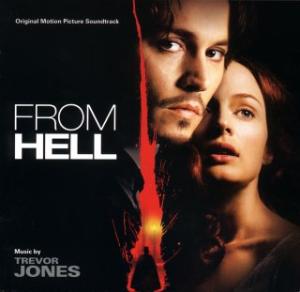Trevor JONES
From Hell
London Voices * Synthesisers performed by the composer * EWI: Phil Todd * Female vocalist: Belinda Skyes * Chinese flutes: Andy Findon * Chinese musicians: Ray Mann Chinese Orchestra * soprano: Amanda Floyd * contralto: Heather Cairncroff * orchestrated by the composer and conductor with Julian Kershaw & John Bell * The Nobodies performed by Marilyn Manson
Academy of St. Martins in the Field conducted by Geoffrey Alexander
VARÈSE SARABANDE VSD-6296 [72:22] [72:24 - including song by Marilyn Manson: 4.59]

As befits a major release this Varèse Sarabande issue has an expansive running time and a full colour booklet, though unlike many recent albums on the label it does not trouble to credit each individual member of the orchestra. This is of course no great loss. The disc opens with the near obligatory contemporary "song" which has nothing to do with the film or the era in which the drama is set, in this case five minutes of heavy metal "performed" by Marilyn Mason. If such rubbish has to be on soundtrack albums at all, best it be the first cue, where it can easily be skipped.
That leaves over 67 minutes of Trevor Jones' score from what is by all accounts a superior thriller focusing on the most famous serial killer of all, the murderer forever dubbed "Jack the Ripper". As can be seen from the credits Trevor Jones employs a wide range of forces, right down to pastiching a very early wax cylinder recording of a popular song for the final track. He opens however with a Wagnarian motif which is entirely appropriate to the period, perhaps a sly hint as to the solution to the central mystery of the film, and straight out of Excalibur, also scored by Mr Jones some 20 years ago. The 12 score cues are lengthy, the seven minute "In Memorandum" moving from Wagner to a romantic theme akin to Jones Merlin, to brief electronic rhythm, to more suspense and atmospheric writing which again bears much in common with the latter day Arthurian score. Following cues such as "A Sprig of Grapes" and "Whitechapel Murders" are extended essays in dark textures, orchestra and electronics blending into nocturnal soundscapes filled with spectral menace. This is all impeccably crafted and doubtless works superbly well with the film, but like much a-melodic thriller writing can become a little wearing on disc when presented at such length. It is not until the sixth score cue, "Portrait of a Prince" that a full blown tune emerges from the London fog. The lyrical, aching melody briefly recalls Miklós Rózsa at his most haunted, around the period of Providence (1977), and then one remembers that Rózsa wrote an absolutely brilliant score for the best ever Jack the Ripper movie, Time After Time (1979) during the same stage of his career.
As Jones' score continues more suspense writing extends across "Investigation", Death Coach" and "Pennies for the Ferryman". Gradually one sinks into this musical world, becoming absorbed by its slow, dreamlike pace, by its surreal visions and nightmares. It is a superior score, though one which takes time to reveal itself, and which may be best appreciated if listened to a handful of tracks at once. Those who have a liking for Howard Shore's magisterial The Silence of the Lambs will find much worthy of their attention here, as this is a good example of modern, restrained and sophisticated serial killer scoring. Others looking for much in the way of tunes, should steer clear. It's not a great score - there's an over-reliance on off-the-shelf electronic patches, including the endlessly overused effect which was, if memory serves, preset No. 9 (underwater) on the Proteus 3: World sound module - and other devices which seem too close to Jones' past work to be entirely original. Nevertheless, with production and musicianship of a very high order this is good stuff for fans of the dark side of film music, and as such recommended with reservations.
Gary S. Dalkin

Return to Index